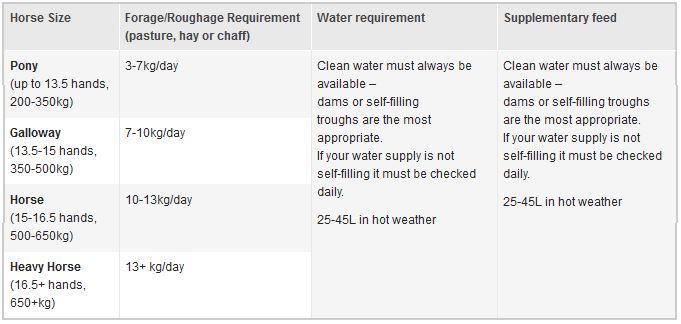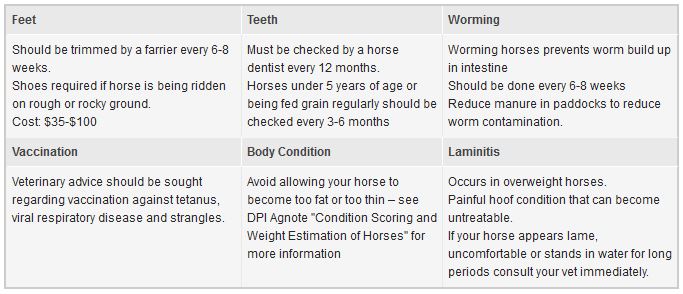Horses
Owning a horse can be a rewarding and enjoyable experience. Whether a horse is used for pleasure riding, competition or just kept as a pet, it can make a wonderful companion and activity.
There are many important responsibilities associated with owning a horse. Owning a horse is a long-term commitment, requires significant time and effort, and is expensive.
Buying a Horse? Things to Consider...
- How much time and money do you have to spare? Keeping a horse requires substantial commitment and is expensive.
- Do you have a suitable property to keep the horse on that is appropriately fenced, suitable for catching and working the horse, contains adequate pasture or other feed, and is close enough to home to allow daily visits?
- Can you afford to purchase gear, including a saddle, saddle blanket, bridle, grooming gear, feed and water containers, and riding clothes, including a suitable hard hat and riding boots? Also include the cost of, and access to, a pony club or riding lessons.
- Arrange an examination of the horse from your own vet before buying. While expensive, this may save you from buying a horse that is unhealthy, lame or otherwise unsuitable. If possible, take an experienced horse person with you to assist with selection of a suitable horse to buy. A trial period before buying is ideal so you can be sure that the horse is suited to you.
Horse Care Basics
Feed
Horses must have access to an adequate amount of good quality feed in the form of roughage (pasture, hay or chaff) to keep them in good body condition. A guide to the amounts to feed is 1-2 kg per 100kg of bodyweight. You may need to supplementary feed a horse that is being worked regularly or if there is not enough pasture and the horse is losing body condition. Provide a salt lick or mineral block in paddock. Check with your veterinarian for suitable supplementary feeds – grass clippings and many food scraps are not suitable feed as they can cause a horse to become ill.
Water
Clean water must always be available. A dam or self-filling trough is best. Bath tubs, if used, must be checked daily and re-filled if necessary. Dams and self-filling troughs should also be checked frequently. Buckets are not suitable as a permanent water supply as they can be tipped over. As a guide, a horse may drink 25-45 litres per day in hot weather.
Feed and Water General Guide:

Shelter
Horses need shelter from extremes of sun, wind and rain. Trees or a walk-in shed / stable make suitable shelter. A waterproof rug can be used to protect the horse from cold weather but must be checked daily for rubbing, slipping off and leaking.
Exercise/Space
Horses must have enough space to walk and run around, unless they are exercised daily. Sick horses may need to be confined under the directions of a veterinarian. Tethering of horses is only acceptable for the short-term and requires daily supervision and inspection, provision of adequate feed and water, suitable tethering equipment and flat terrain. Horse must not be tethered long-term.
Paddocks
Fences must be kept in good repair to prevent injury and escape. Remove rubbish and weeds regularly to prevent injury to the horse. Be aware to prevent threats or attractions that can cause a horse to be injured by a fence.
General Health Care
Feet
Have a farrier trim the hooves every 6-8 weeks to prevent them chipping or becoming too long and uncomfortable for the horse. Shoes are only needed if the horse is to be ridden on hard or rocky ground.
Teeth
Horse's teeth need to be checked by a dentist at least once a year for a horse kept in a paddock. If not treated they can become sharp and cause pain and mouth injuries. Horses under the age of 5, or those fed grain, need a dental check at least once every 3-6 months.
Worming
Worm your horse regularly to prevent worms building up in the stomach and intestines. Many worming pastes require use every 6-8 weeks. Follow the directions on the product as dosage frequency and amounts vary. Reducing the build-up of manure in your horse's paddock is also a simple way to reduce worm contamination of pastures.
Vaccination
Have the vet vaccinate your horse for diseases such as tetanus, viral respiratory disease and strangles. Your vet will advise what your horse should be vaccinated for and how often.
Monitor body condition
Do not let your horse get too fat or too thin. As a guide, if the ribs are showing it means the horse is too thin. A round rump, big belly and crested neck means the horse is too fat. Ideally ribs should be able to be felt but not be seen.
Laminitis (founder)
Some horses that get too fat, particularly ponies, can develop laminitis. This is a very painful hoof condition that may be untreatable and require the horse to be "put down". Consult a vet if the horse appears lame or uncomfortable.
General Horse Care Guide:

Company
Horses are herd animals and need the company of others, whether in the same paddock or a neighbouring paddock. Keeping a horse on it's own so that it can not see other horses may lead to behaviour problems in the paddock or when out riding.
Supervision
Check your horse carefully at least daily to make sure it has enough feed and water, and is not injured or ill. Consult a vet if the horse is injured or ill. If handled frequently, your horse will be easier to manage when the farrier, vet or dentist comes.
Stallions
Stallions are difficult to manage and are not suitable as companions. Have all colts and stallions desexed (gelded) unless they are to be used for breeding. Geldings and mares make much more controllable companions than stallions.
If you can't keep your horse
If you can no longer care for the horse, you must arrange for it to be cared for by someone else, have it adopted or sold, or have it "put down" by a vet. It is much kinder to have the horse put to sleep than let it suffer from neglect.
Riding
If your horse can be ridden, attending pony club or having regular riding lessons will help you to learn to ride properly and enjoy your time with the horse more. If you have little or no experience riding a horse you should seek professional training from a riding instructor, pony/adult horse club, or riding establishment.
Purchasing properly fitting riding equipment is essential to ensure your safety and prevent injury to your horse. Consult with your local saddlery and/or riding instructor for advice on the appropriate riding equipment for you and your horse.
Breeding
Breeding horses is expensive, time consuming and requires special facilities. Breeding horses should not be done indiscriminately and should only be done by, or with the advice of, experienced people.
